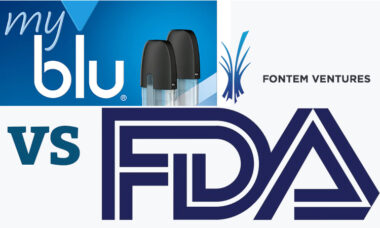 An appellate court in the US has overturned the US Food and Drug Administration (FDA)’s rejection of unflavoured e-cigarette products from Fontem, but supported the rejection of flavoured products.
An appellate court in the US has overturned the US Food and Drug Administration (FDA)’s rejection of unflavoured e-cigarette products from Fontem, but supported the rejection of flavoured products.
The 29th August ruling from the US Court of Appeals for the DC Circuit says the FDA “did not take into account the potential benefits of unflavoured products or weigh those benefits against risks to the public health”.
It affirms, however, the marketing denial orders (MDOs) for flavoured products, saying the agency acted reasonably when it argued that the benefits of these products to adult smokers had not been proven to outweigh the risks to young non-smokers.
The FDA announced the MDOs in April 2022. They covered Fontem’s popular Myblu device kit and six flavours, including intense tobacco chill, intense tobacco and gold leaf, and meant that the products could not legally be sold in the US.
Lawyers for Fontem, owned by Imperial Brands, filed an appeal in August 2022 that called the FDA’s review process “deeply flawed” and said it began “with little forethought”.
The DC Circuit only partly agreed with Fontem’s appeal.
Argument for flavours ‘splitting hairs’
First, it said the FDA “lawfully concluded” that Fontem hadn’t proven its flavoured products protected public health, because a study submitted by Fontem did not show that flavoured products have an additional benefit for adult smokers beyond the benefits provided by unflavoured products.
The court cited another case, in 2022, where the FDA’s denial of marketing authorisation to Prohibition Juice Co.’s products was held to be lawful because the FDA had reasonably determined that flavoured products are more dangerous than other tobacco products.
“The agency’s analysis was consistent with the statutory requirements and with the balance we approved in Prohibition Juice,” according to the 24-page ruling in the Fontem case, written by judge Neomi Rao with concurrence from judge John Walker and senior judge Douglas Ginsburg.
Fontem’s lawyers at Latham & Watkins had also argued that the FDA “impermissibly altered its standards” by first requiring Fontem to show a “likelihood” that flavoured products increased switching from combustibles to vapour by adult smokers, and then requiring that Fontem show the benefits of flavours “outweighs the risk to youth”.
However, the DC Circuit said Fontem’s argument amounted to “splitting hairs”.
“While the FDA may have used different words in the deficiency letter and the denial order, the underlying public health analysis was the same,” according to the ruling.
FDA ‘shifting the regulatory goalposts’
But the court had a different take on the FDA’s analysis of Fontem’s unflavoured products. It said that with those products, the agency “failed to analyse the trade-offs necessary to make a public health finding”. It also said the FDA didn’t explain how the “deficiencies” it identified in Fontem’s premarket tobacco applications (PMTAs) related to a failure to protect public health.
It said the applications could have been denied, regardless of the products’ potential public health consequences, if the FDA had had rules in place requiring consistency in the composition and manufacturing of tobacco products. But the agency didn’t have such rules, and instead had chosen to assess applications individually on public health grounds.
As a result, the court said, the FDA must undertake a “holistic inquiry” into each application. And it concluded that “the agency failed to engage in the necessary analysis with respect to Fontem’s unflavoured products”.
The ruling also notes that the FDA “changed its tune in the denial order, reproaching Fontem for failing to provide information the agency had never explicitly sought”.
“Shifting the regulatory goalposts without explanation is arbitrary and capricious,” according to the ruling.
Numerous e-cigarette companies have challenged the FDA’s marketing denial orders in court, with mixed success. There has also been much speculation that the agency is in effect enforcing a de facto ban on flavoured products, by refusing to approve any, although no such policy has been acknowledged.
The FDA’s response to the Fontem appeal suggested that the agency had not decided against all flavoured vaping products, saying that “some manufacturers submitted evidence of a type that could potentially support such a finding for their flavoured products, and those applications remain under agency review”.
– Meghann Cuniff ECigIntelligence US legal correspondent






